On 2 February 1848, an American diplomat and three Mexican officials signed the Treaty of Guadalupe Hidalgo that ended the Mexican-American War and granted to the United States a huge swath of Mexican territory. Perhaps fittingly, the treaty ending the war’s bloodshed was signed on the main altar of a church called the Basilica of Guadalupe in the Mexico City suburb town of Hidalgo, hence its name.
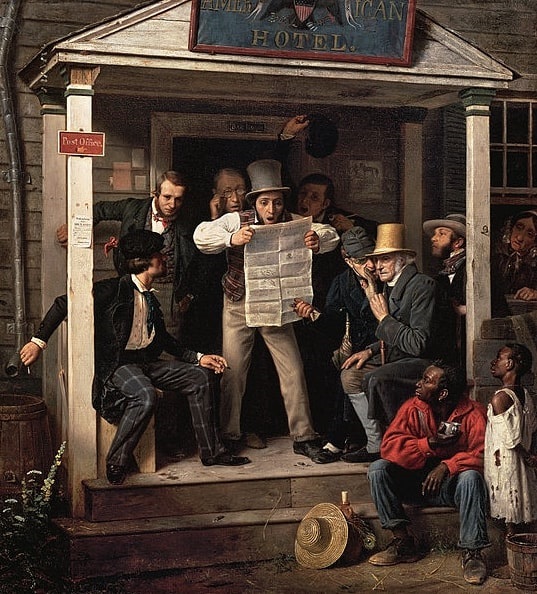
There was little justification for the United States having gone to war with Mexico in the first place: the military conquest was really a giant land grab as Americans, driven by their conception of “Manifest Destiny,” were determined that their country would stretch from the Atlantic to the Pacific.
The Mexicans were beaten militarily and their government was in shambles; they were in no position to argue as the Americans dictated terms highly favorable to the United States. For $15 million Mexico ceded all of the present states of California, Nevada, and Utah, as well as large parts of Colorado, Arizona, New Mexico, and Wyoming.
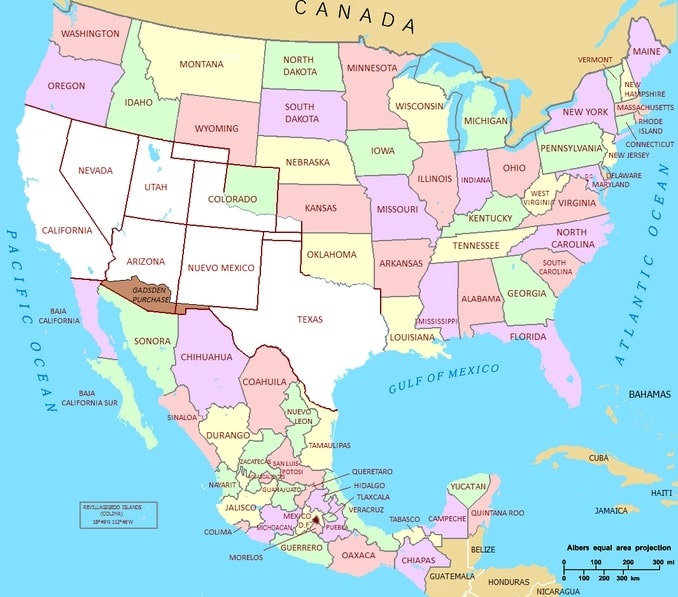
Since the treaty also forced Mexico to abandon claims on Texas (never having recognized the Texas Revolution of 1836 or the annexation of Texas by the U.S. in 1845), Texas can be added to that staggering list of Mexican cessions. The U.S. also agreed to settle claims by American citizens against Mexico that amounted to about $3.25 million.
On the day the treaty was signed, the American press was rife with rumors of a possible end to the war.
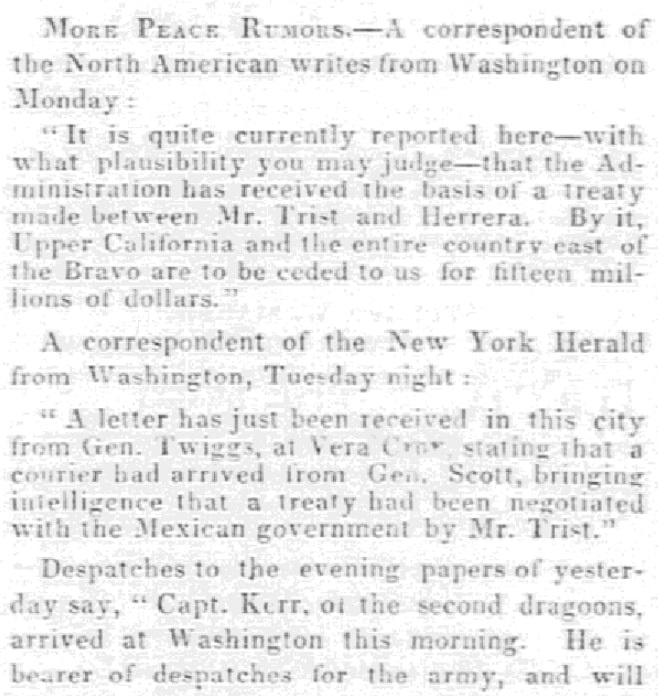
Here is a transcription of this article:
MORE PEACE RUMORS.
A correspondent of the North American writes from Washington on Monday:
“It is quite currently reported here – with what plausibility you may judge – that the Administration has received the basis of a treaty made between Mr. Trist and Herrera. By it, Upper California and the entire country east of the Bravo are to be ceded to us for fifteen millions of dollars.”
A correspondent of the New York Herald from Washington, Tuesday night:
“A letter has just been received in this city from Gen. Twiggs, at Vera Cruz, stating that a courier had arrived from Gen. Scott, bringing intelligence that a treaty had been negotiated with the Mexican government by Mr. Trist.”
Dispatches to the evening papers of yesterday say:
“Capt. Kerr, of the second dragoons, arrived at Washington this morning. He is bearer of dispatches for the army, and will probably throw some light on the peace rumors.”
The Observer at Washington, on the part of the Philadelphia Ledger, writes as follows, under date of Jan. 23d:
“The news which reached here by the last night’s mail, of the certainty of Gen. Herrera’s election to the Presidency in Mexico, is looked upon, in a high quarter, as the harbinger of peace, but I do not see that there is, notwithstanding this probable event, any substantial prospect of peace. Herrera was, no doubt, from the commencement, for receiving Slidell, and for settling the difficulties between the two countries by treaty, but he was overruled then, and would no doubt be overruled now, were our troops to be withdrawn from Mexico.
“Mr. Trist has no doubt disobeyed orders by staying in Mexico so long after his official recall, but if he succeeds in patching up some kind of peace that may afterwards obtain a two-third majority in the Senate, high honors are in store for him. If the case turns out differently, the whole responsibility will be thrown upon him, and he will be overwhelmed.
“The town is full of rumors of peace commissioners which are daily expected from Mexico, but I doubt whether the Administration would venture to treat with them. There is no government in Mexico that can give security for the future, though it may nominally give indemnity for the past. No government treating with us now can give security for its own existence in [the] future, and can only live and treat with us under the protection of our army.”
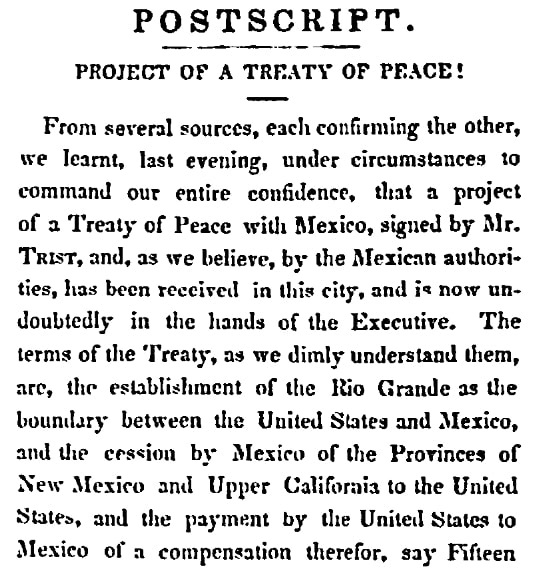
Here is a transcription of this article:
POSTSCRIPT.
PROJECT OF A TREATY OF PEACE!
From several sources, each confirming the other, we learnt, last evening, under circumstances to command our entire confidence, that a project of a Treaty of Peace with Mexico, signed by Mr. Trist, and, as we believe, by the Mexican authorities, has been received in this city, and is now undoubtedly in the hands of the Executive. The terms of the Treaty, as we dimly understand them, are, the establishment of the Rio Grande as the boundary between the United States and Mexico, and the cession by Mexico of the Provinces of New Mexico and Upper California to the United States, and the payment by the United States to Mexico of a compensation therefore, say Fifteen Millions of Dollars.
However the fact may vary from these particulars, there is no doubt that the Treaty substantially to this effect is now in this city.
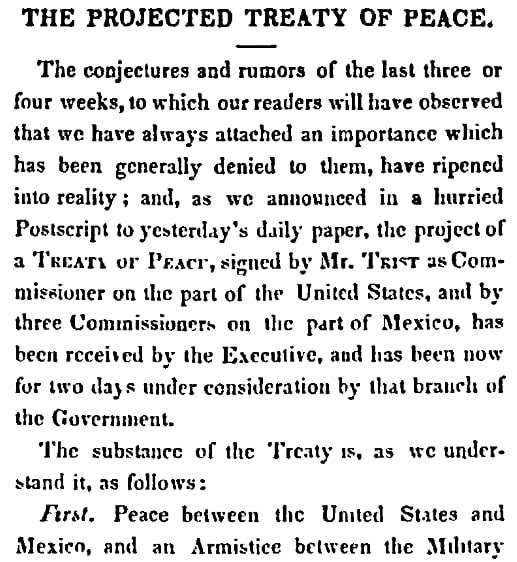
Here is a transcription of this article:
THE PROJECTED TREATY OF PEACE.
The conjectures and rumors of the last three or four weeks, to which our readers will have observed that we have always attached an importance which has been generally denied to them, have ripened into reality; and, as we announced in a hurried Postscript to yesterday’s daily paper, the project of a Treaty of Peace, signed by Mr. Trist as Commissioner on the part of the United States, and by three Commissioners on the part of Mexico, has been received by the Executive, and has been now for two days under consideration by that branch of the Government.
The substance of the Treaty is, as we understand it, as follows:
First. Peace between the United States and Mexico, and an Armistice between the Military Commanders of the two countries during such time as the Treaty shall be in suspense.
Secondly. Mexico agrees, in consideration, &c., that the boundary between the United States and Mexico shall hereafter be from the Sea up the middle of the Rio Grande to the boundary of New Mexico, and thence in a line which (with some digression) is to run west (or nearly west) to the Pacific Ocean, and strike a point south of the port of San Diego.
Thirdly. In consideration of this large cession of Territory the United States are to pay to Mexico the sum of Fifteen Millions of Dollars, and to satisfy all the just claims of citizens of the United States against the Government of Mexico.
The Treaty is understood to contain many provisions of detail; but does not, as we hear, include any provision, as has been reported, for the maintenance of a Military force by the United States for a certain time in Mexico.
The Treaty makes its appearance in a questionable form; being concluded by Mr. Trist, as with full powers, after those powers had been withdrawn, or intended to be withdrawn, by the Executive. It is understood, however, that the Treaty, such as it is, will be submitted by the President to the Senate for its consideration. What will be its fate in that body we shall not undertake to predict.
We can at least rejoice at one thing: that for the present there is a cessation of hostilities in Mexico. May it be perpetual!
Note: An online collection of newspapers, such as GenealogyBank’s Historical Newspaper Archives, is not only a great way to learn about the lives of your ancestors – the old newspaper articles also help you understand American history and the times your ancestors lived in, and the news they talked about and read in their local papers. Did any of your ancestors serve in the Mexican-American War? Please share your stories with us in the comments section.
Related Articles:
